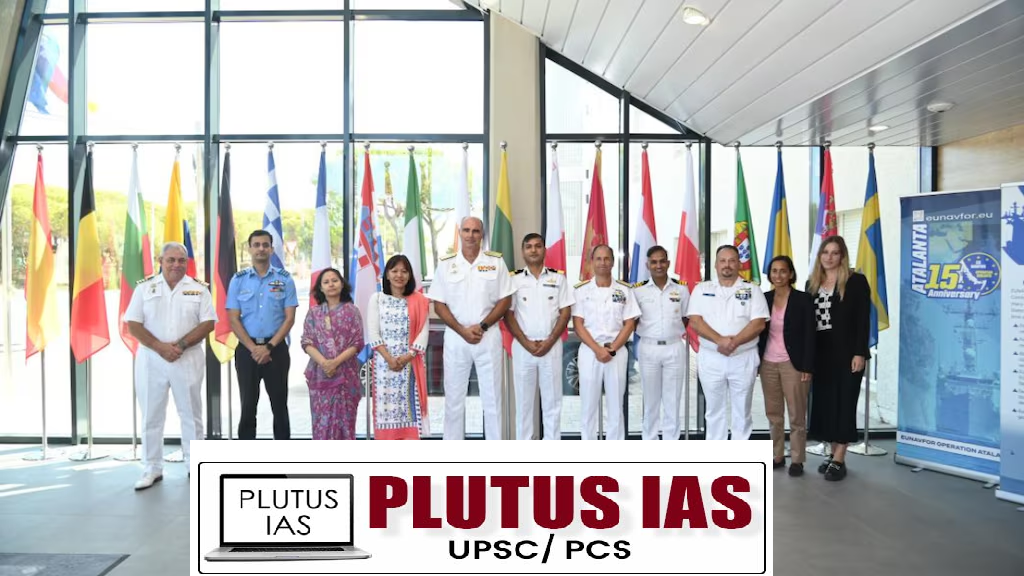09 Sep India, EU Strengthen Defence Ties in Indo-Pacific Initiative
Syllabus mapping:
GS-3-Security:India, EU Strengthen Defence Ties in Indo-Pacific Initiative
FOR PRELIMS:
Discuss the significance of the strengthened defense ties between India and the European Union (EU) within the context of the Indo-Pacific region. How do these enhanced relations impact regional security dynamics, and what are the potential challenges and benefits for both parties involved?
FOR MAINS:
Evaluate the implications of the strengthened defense ties between India and the European Union (EU) within the Indo-Pacific region. How does this enhanced partnership influence regional security dynamics, and what are the potential challenges and benefits for both India and the EU?
RECENT CONTEXT:
The Indo-Pacific region, a pivotal arena for global trade and geopolitical maneuvering, has seen a notable shift in strategic alliances and defense partnerships in recent years. Among the key developments is the strengthening of defense ties between India and the European Union (EU). This emerging alliance reflects broader geopolitical trends and addresses specific regional challenges. This article delves into the recent context of this strategic partnership, exploring its implications, challenges, and potential benefits for both India and the EU.
Objectives of the Visit
The EU delegation to India helped arrange this visit. It included officials from India’s Defence Ministry and the Ministry of External Affairs (MEA). The purpose was to understand the EU’s security and defence systems, particularly its Common Security and Defence Policy (CSDP). The CSDP focuses on the EU’s missions, including in important regions like the Indo-Pacific, where both India and the EU have shared interests.
The Strategic Importance of the Indo-Pacific
The Indo-Pacific region, encompassing the Indian Ocean and the Pacific Ocean, is pivotal to global trade and security. It is home to vital sea lanes of communication, through which a substantial portion of global trade transits. The region also hosts several key maritime chokepoints and is central to global energy supplies. Its strategic significance is further amplified by the presence of major economies and emerging powers, contributing to a complex and competitive geopolitical environment.
As the region grows in importance, India and the EU have identified it as a focal point for enhancing their strategic and defense collaboration. Both parties recognize the need to address challenges such as maritime security, territorial disputes, and the rise of regional powers like China.
Recent Developments in India-EU Defense Cooperation
- Joint Statements and Strategic Frameworks: In recent months, India and the EU have made significant strides in formalizing their defense cooperation through joint statements and strategic frameworks. A key development came in July 2024, when Indian Prime Minister Narendra Modi and European Commission President Ursula von der Leyen issued a joint declaration reaffirming their commitment to a rules-based international order in the Indo-Pacific. This declaration emphasized their shared objectives of promoting maritime security, countering illegal activities at sea, and fostering regional stability.
- Enhanced Maritime Security Collaboration: A significant aspect of the India-EU defense partnership is the enhancement of maritime security cooperation. This includes joint naval exercises designed to improve interoperability and strategic coordination. In August 2024, India and the EU conducted their largest joint naval exercise to date, involving complex maneuvers and tactical operations aimed at addressing maritime threats such as piracy, trafficking, and territorial disputes. This exercise was a testament to their commitment to maintaining a secure and open maritime domain.
- Capacity Building and Technological Exchange: The EU has also committed to supporting India’s maritime capabilities through capacity-building initiatives. This includes providing technical assistance, training, and resources to enhance India’s ability to secure its maritime borders and contribute to regional stability. The EU’s involvement in technological exchange aims to modernize India’s naval assets and improve its maritime surveillance capabilities.
- Strategic Dialogues and High-Level Meetings: High-level strategic dialogues between India and the EU have been instrumental in deepening their defense ties. These dialogues, held on various occasions, have addressed key issues such as regional security dynamics, intelligence sharing, and strategic cooperation. Notable recent meetings include the India-EU Strategic Partnership Summit in June 2024, where leaders from both sides discussed the evolving security landscape and outlined future cooperation areas.
PRELIM QUESTION:
Q.Which of the following statements best describes the recent strengthening of defense ties between India and the European Union (EU) in the Indo-Pacific region?
A) The primary goal of the India-EU defense cooperation is to counter the influence of the United States in the Indo-Pacific region.
B) The India-EU defense partnership focuses on enhancing maritime security, conducting joint naval exercises, and promoting a rules-based international order in the Indo-Pacific.
C) India and the EU have primarily strengthened their defense ties in response to regional tensions in the Mediterranean Sea.
D) The recent India-EU defense initiatives are solely focused on providing economic aid and trade benefits to the participating countries.
Answer Key: (b)




No Comments